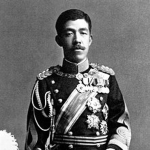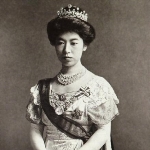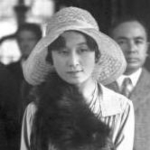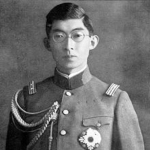Background
Prince Takamatsu was born on January 5, 1905 in Tokyo, Japan. He was the third son of Emperor Taisho (Yoshihito) and Empress Teimei (Sadako) and a younger brother of Emperor Shōwa (Hirohito).

1921
Emperor Taishō's four sons in 192: Hirohito, Takahito, Nobuhito and Yasuhito.
1930
Prince and Princess Takamatsu in Berlin.













宣仁 高松宮
Prince Takamatsu was born on January 5, 1905 in Tokyo, Japan. He was the third son of Emperor Taisho (Yoshihito) and Empress Teimei (Sadako) and a younger brother of Emperor Shōwa (Hirohito).
Prince Takamatsu attended the Imperial Japanese Naval Academy from 1922 to 1925. The prince studied at the Naval Aviation School at Kasumigaura in 1927 and the Naval Gunnery School at Yokosuka in 1930 - 1931.
He graduated from the Naval Staff College in 1936.
Prince Takamatsu received a commission as an ensign on 1 December 1925 and took up duties aboard the battleship Fusō. In 1930, he was promoted to lieutenant and attached to the Imperial Japanese Navy General Staff in Tokyo. He became a squadron commander of cruiser Takao, two years later and subsequently was reassigned to the Fusō. He was promoted to the rank of commander on 15 November 1940 and finally to captain on 1 November 1942. From 1936 to 1945, he held various staff positions in the Naval General Staff Office in Tokyo.
From the 1930s, Prince Takamatsu expressed grave reservations regarding Japanese aggression in Manchuria and the decision to wage war on the United States. In 1991, his wife Kikuko, Princess Takamatsu and an aide discovered a twenty-volume diary, written in Prince Takamatsu's own hand between 1934 and 1947. Despite opposition from the entrenched bureaucrats of the Imperial Household Agency, she gave the diary to the magazine Chūōkōron which published excerpts in 1995.
The diary revealed that Prince Takamatsu bitterly opposed the Kwantung Army's incursions in Manchuria in September 1931, the expansion of the July 1937 Marco Polo Bridge Incident into a full-scale war of aggression against China and in November 1941 warned his brother, Hirohito that the Imperial Japanese Navy could not sustain hostilities for longer than two years against the United States. He urged Emperor Shōwa to seek peace after the Japanese naval defeat at the Battle of Midway in 1942; an intervention which apparently caused a severe rift between the brothers.
After the Battle of Saipan in July 1944, Prince Takamatsu joined his mother Empress Teimei, his uncles Prince Higashikuni, Prince Asaka, former prime minister Konoe Fumimaro, and other aristocrats, in seeking the ouster of the prime minister, Tojo Hideki.
After the end of WWII, Prince Takamatsu became the honorary president of various charitable, cultural and athletic organizations. He also served as a patron of the Japanese Red Cross Society (present day the Honorary President is Empress Michiko) and was a major contributor of the NBTHK (Nihon Bijutsu Token Hozon Kyokai or Society for the Preservation of the Japanese Sword). He also officiated the Honorary President of the Preparatory Committee for founding International Christian University (ICU) located in Mitaka, Tokyo.
Prince Takamatsu died of lung cancer on February 3, 1987 at the Japanese Red Cross Medical Center (located in Shibuya, Tokyo). His remains were buried at Toshimagaoka Cemetery located in Bunkyō, Tokyo.
On 4 February 1930, Prince Takamatsu married Kikuko Tokugawa (26 December 1911 – 18 December 2004), the second daughter of Yoshihisa Tokugawa (peer). The bride was a granddaughter of Yoshinobu Tokugawa, the last Shōgun of the Tokugawa shogunate, and a granddaughter of the late Prince Arisugawa Takehito. Prince and Princess Takamatsu had no children.

Emperor Taishō (大正天皇) was the 123rd Emperor of Japan, according to the traditional order of succession, reigning from 30 July 1912 until his death in 1926.

Empress Teimei (貞明皇后) was the wife of Emperor Taishō of Japan. She was the mother of Emperor Shōwa. Her posthumous name, Teimei, means "enlightened constancy".

Kikuko, Princess Takamatsu (宣仁親王妃喜久子) - was a member of the Japanese Imperial Family. She was mainly known for philanthropic activities, particular her patronage of cancer research organizations.

Prince Chichibu was the second son of Emperor Taishō, a younger brother of the Emperor Hirohito and a general in the Imperial Japanese Army.
